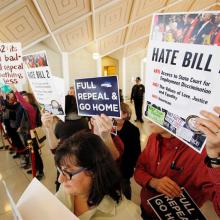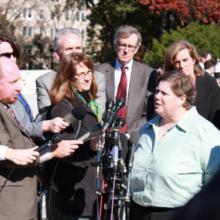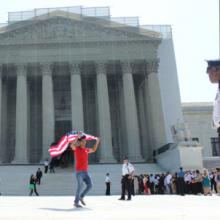U.S. Supreme Court
A deal has fallen apart to undo the North Carolina law known as the “bathroom bill,” in a sign of the state’s bitter political divide.
The state’s legislature was called into a special session on Dec. 21, to consider repealing the law known as HB2 after months of pressure, including lost jobs and canceled sporting events and concerts.
If the Supreme Court rules that there is a constitutional right to gay marriage, religious charities could be in for a big shock.
Religious people who believe in marriage as it has been for “millennia” (as Justice Kennedy put it) have lost business, lost jobs, and been sued by their own government. Those of us who support laws that protect both gay couples and religious people find these developments troubling. But if the Supreme Court rules that there is a constitutional right to gay marriage without reaffirming the rights of religious people, we will see many more situations like this.
As the U.S. Supreme Court prepares to hear arguments on April 28 that could wind up legalizing gay marriage nationwide, dozens of Christian leaders have issued a call to civil authorities to preserve “the unique meaning of marriage in the law” — but also to “protect the rights of those with differing views of marriage.”
The open letter “to all in positions of public service,” released April 23, seems to reflect a growing recognition by same-sex marriage foes that they may be on the losing side of the legal battle to bar gay marriage and need to broaden their focus to securing protections for believers.
Gay marriage opponents are also losing the battle for the hearts and minds of their own flocks: Polls show that American believers, like the rest of the public, are growing much more accepting of same-sex relationships, or at least much less inclined to invest time or resources into waging the fight against legalizing gay marriage.
This week’s statement, “The Defense of Marriage and the Right of Religious Freedom: Reaffirming a Shared Witness,” was signed by 35 religious leaders representing Catholic, evangelical, Pentecostal, Orthodox, and Mormon churches. The only non-Christian signatory was Imam Faizul Khan of the Islamic Society of Washington Area.
The leaders forcefully reiterate their shared belief that marriage is “the union of one man and one woman” and argue that apart from religious doctrines, the state “has a compelling interest in maintaining marriage” for the good of society and the “well-being of children.”
State bans on same-sex marriage have been justified based on judicial precedent, states’ rights, regulating procreation, optimal child-rearing, and centuries-old tradition. Those reasons also have been loudly debunked.
When it convenes April 28 for one of the most historic oral arguments in its 226-year history, the Supreme Court will hear all of those arguments and more from five lawyers representing gays and lesbians on one side, and the states of Kentucky, Michigan, Ohio, and Tennessee on the other. But the justices also will have read what dozens of federal trial and appeals court judges have written.
Here’s a look at five major arguments cited by those appeals court judges in their rulings. In addition to the four Midwest states whose bans were upheld, the circuit courts struck down similar bans in Idaho, Indiana, Nevada, Oklahoma, Utah, Virginia, and Wisconsin.
1. Judicial Precedent
The first hurdle in the gay marriage debate facing lower court judges has been what to make of a 1972 Supreme Court ruling that denied marriage rights to a gay couple in Minnesota.
The one-line summary decision in Baker v. Nelson upheld the state’s ban on same-sex marriage “for want of a substantial federal question.” At the time, marriage was seen as the exclusive purview of the states.
Because of the wealth of judicial rulings that have come in the following four decades, most federal judges have reasoned that Baker does not tie their hands.
“Since Baker, the court has meaningfully altered the way it views both sex and sexual orientation through the equal protection lens,” the U.S. Court of Appeals for the 4th Circuit ruled in the Virginia case, Bostic v. Schaefer. The panel’s majority noted that the justices did not even mention the 1972 case when they struck down a key section of the federal Defense of Marriage Act in 2013.
In the case of Obergefell v. Hodges now before the Supreme Court, however, Judge Jeffrey Sutton of the U.S. Court of Appeals for the 6th Circuit differed with all the previous rulings.
“This type of summary decision, it is true, does not bind the Supreme Court in later cases,” he wrote for his panel’s 2-1 majority.
“But it does confine lower federal courts in later cases.”
2. State's Rights
Congregations in New York City that rent space in public schools will be able to hold Easter services this Sunday despite a ruling on March 30 by the U.S. Supreme Court rejecting an appeal from an evangelical church in the Bronx that sought to overturn a ban on after-hours worship services at public schools.
A spokesman for Mayor Bill de Blasio also said that the mayor would work to ensure that houses of worship could continue to rent space like any other group.
“Now that litigation has concluded, the city will develop rules of the road that respect the rights of both religious groups and nonparticipants,” Wiley Norvell said in response to the ruling.
“While we review and revise the rules, groups currently permitted to use schools for worship will continue to be able to worship on school premises.”
Pastor Robert Hall of the Bronx Household of Faith, which was the plaintiff in the case, said he was cautiously optimistic after the administration’s response.
“We are gratified that he is allowing the churches to stay,” Hall told The New York Times.
The Supreme Court will decide whether to allow same-sex marriage nationwide later this year. But it’s leaving little doubt which way it’s leaning.
The latest evidence came Feb. 9 when the high court denied Alabama’s request to block gay marriages while the state appeals a federal judge’s ruling that allowed gays and lesbians to wed.
That was the same decision the justices reached in Florida two months ago, allowing the Sunshine State to become the 36th in the nation where same-sex marriage is legal. Alabama now becomes the 37th.
But things were different last year, when the Supreme Court temporarily blocked gay marriages in Utah in January, and in Virginia in August, while the legal issue played out.
Why the change?
It looks like the death penalty may be on life support.
January was set to be the deadliest month for U.S. executions in 2015, but nine of the 15 executions were stopped. In an unprecedented wave, three of the deadliest states stopped executions planned for last month — Texas, Oklahoma, and Missouri. February has just begun, but nine of its 12 scheduled executions have been halted.
Last year was not a good year for the death penalty, either, as death sentences hit a 40-year low and executions were at a 20-year low.
There were botched executions such as that of Clayton Lockett, who writhed in pain for 43 minutes before dying of a heart attack, with the Oklahoma prison warden calling it “a bloody mess.”
Then there were the exonerations, such as that of Ricky Jackson in Ohio, who spent 39 years in prison for a crime he didn’t commit, convicted solely on the testimony of a 12-year-old boy who recanted.
For most of recorded history, Isis was an Egyptian goddess, a benevolent type who cared for widows and orphans, cured the sick and even brought the dead back to life.
This year, the world met the other ISIS.
The rise of the so-called Islamic State, variously known as ISIS or ISIL, dominated headlines in 2014 as a self-proclaimed caliphate sowed death and destruction across Iraq and Syria. For some, the group confirmed their worst fears about Muslim extremists, bent on killing religious minorities and subjugating women in a quest for domination that included leveling villages and beheading hostages.
The terror wrought by the Islamic State reflected a sense of turbulence that upended international news in 2014. But it was not the only source of unrest. The Ebola virus in west Africa put the world on edge, and a bloody war between Israelis and Palestinians in Gaza, kidnapped schoolgirls in Nigeria and the slaughter of more than 100 children at a military school in Pakistan added to the mix.
At home, America wrestled with police brutality as grand juries declined to prosecute officers in the deaths of unarmed black men in Ferguson, Mo., and New York City. From botched prison executions to a stream of desperate migrant children flooding America’s southern border, things felt troubled, disorienting, always on the verge of breaking apart.
Religion played a large role in those stories, and in other major headlines from 2014:
Corporations are not people — no matter what five Supreme Court justices and a failed presidential candidate may say.
I take that position on the basis of my religious faith, the very test that the justices applied in Burwell v. Hobby Lobby.
My tradition tells me to ask essential questions.
So here is where I start: May a golem be counted in a minyan? A minyan is a quorum required for certain Jewish prayers, and a golem is a mythological creature created from clay and animated by a sacred incantation.
The golem’s “sculptor” controls its actions; it has no real will of its own.
When the Supreme Court on Monday issued a split decision narrowly backing the right of for-profit corporations to deny contraception coverage to their employees for religious reasons, many assumed that faith-based nonprofits would have it easy when their own cases eventually reach the high court.
“The death knell is sounding for the HHS mandate,” said Lori Windham, an attorney at the Becket Fund for Religious Liberty, which is representing the Little Sisters of the Poor, an order of nuns, as well as other religious groups that object to the Health and Human Services Department policy requiring birth control coverage.
Windham noted that in two rulings by lower courts on Monday, several of Becket’s faith-based clients received last-minute relief to shield them from complying with the mandate, which takes effect today.
For years, opponents of the Islamic Center of Murfreesboro vowed to take their legal fight to shut down the mosque all the way to the U.S. Supreme Court.
That fight ended Monday, when the nation’s highest court declined to hear their case.
The four-year conflict over construction of the mosque, which opened in 2012, brought national attention to this Bible Belt city of 112,000 about 30 miles south of Nashville.
Hundreds marched in protest after Rutherford County officials approved plans for the mosque in 2010. Televangelist Pat Robertson labeled the Islamic center a “mega mosque” and claimed Muslims were taking over Murfreesboro. An arsonist set fire to construction equipment on the building site.
Mosque opponents eventually filed a suit against Rutherford County, seeking to block construction of the worship space.
On Monday, the U.S. Supreme Court ruled that a city, town, or county could open its regular meetings with a sectarian (that is, Christian) prayer without violating the First Amendment’s Establishment Clause. Not unexpectedly, the much-anticipated Town of Greece v. Galloway decision split the court 5-4. It is, for that and other reasons, a less than satisfying decision.
Yet another Pledge of Allegiance lawsuit has been filed, this time with New Jersey humanists challenging the requirement that each school day begin with recitation of the pledge describing the United States as one nation, “under God.”
This case joins a bevy of previous cases that have wended their way through the courts, costing school districts and states millions of taxpayer dollars and contributing to bitter disputes across the country. To date, the Supreme Court has studiously avoided ruling on such cases, but if this continues, eventually, the court will be required to join the fray.
I am always sorry to see these cases: On the one hand, I am sympathetic with the students and parents who do not want their children indoctrinated in religion by a government, even with a very general declaration of the existence of God. (And I am always disappointed that so many people who vehemently insist that government is incompetent want government to lead prayer.)
The U.S. Supreme Court will soon rule on the constitutionality of prayer at public meetings. But a new survey finds U.S. voters clearly favor prayer – as long the public prayer is generic and not specifically Christian.
A Jew and an atheist brought suit in Greece, N.Y., saying the Christian prayers excluded many citizens and violated the Constitution, which bans government establishment of religion. Even when the town began inviting non-Christians to give invocations, the “establishment” issue remained a question.
When Vanessa Willock wanted an Albuquerque photographer to shoot her same-sex commitment ceremony in 2006, she contacted Elane Photography. The response came as a shock: Co-owner Elaine Huguenin said she only worked on “traditional weddings.”
“Yes, you are correct in saying we do not photograph same-sex weddings,” Huguenin responded.
Now 7 1/2 years after that e-mail exchange, the Supreme Court is considering whether to referee the dispute.
Once Steve Green sets his path, there’s no turning back.
Not when he saw no point in college, going directly into his family’s Hobby Lobby craft store business. Green, now 50, rose up from assembling picture frames for “bubble gum money” at age 7 through every job, including cleaning toilets, to president of the $3.3 billion national chain, one of the nation’s largest private companies.
And certainly not now when, he says, the U.S. government is challenging his unshakeable Christian faith and his religious liberty.
Arizona Gov. Jan Brewer may have ended the latest controversy in her state by vetoing a “religious freedom” bill that threatened gay men and lesbians, but the nation’s legislatures and courts are just getting started.
While religious liberty remains a “core value” in Arizona, Brewer said Wednesday, “so is non-discrimination.” And therein lies the balancing act that’s at the root of several other disputes.
The answer isn’t simple. Congress and the states often carve out exceptions for religious beliefs. The Supreme Court has consistently made room for religious exercise. And unlike race and gender, sexual orientation is not a protected class — yet.
Conception. Pregnancy. Abortion. Abortifacient.
Those words today are in a rhetorical swamp where contesting religious, medical, and political views muddy understanding. And soon the U.S. Supreme Court will wade in.
On March 25, it will hear challenges to the Affordable Care Act’s provision that employers must provide insurance coverage with no co-pays for contraception.
A federal judge has ruled that an Internal Revenue Service exemption that allows clergy to shield a portion of their salary from federal income taxes is unconstitutional.
The clergy housing exemption applies to an estimated 44,000 ministers, priests, rabbis, imams, and others. If the ruling stands, some clergy members could experience an estimated 5 to 10 percent cut in take-home pay.
The suit was filed by the Wisconsin-based Freedom from Religion Foundation on grounds that the housing allowance violates the separation of church and state and the constitutional guarantee of equal protection. The group’s founders have said that if tax-exempt religious groups are allowed a housing subsidy, other tax-exempt groups, such as FFRF, should get one, too.
Twenty-seven evangelical Christian leaders across Texas and the United States are calling on Harris County District Attorney Devon Anderson to allow a new, fair sentencing hearing for Duane Buck. Mr. Buck is an African-American man who was condemned to death after his sentencing jury was told that he was likely to be a future danger because of his race. These evangelical Christian leaders oppose the setting of any execution date for Mr. Buck.
“We write to respectfully request that you support a new, fair sentencing hearing for death row prisoner Duane Buck,” the letter states. “Although opinions on the death penalty vary within each of our churches, we are strongly united in our view that no death sentence should be a product of racial discrimination, as it was in Mr. Buck’s case.”



















